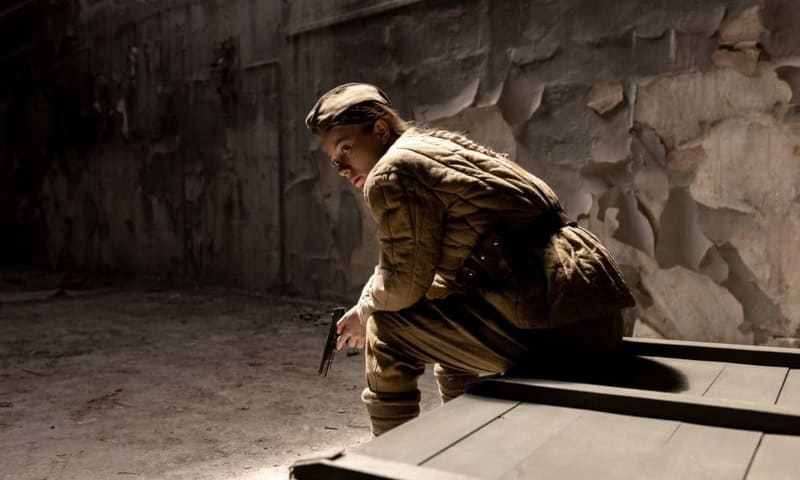‘Burial’ Offers an Interesting Premise with Little New Ground
Balance is everything for a film of this size, and it never quite finds it.

A group of Soviet soldiers is tasked with returning the remains of Adolf Hitler to Joseph Stalin in Moscow. Such is the intriguing premise of writer-director Ben Parker‘s second feature, Burial, an ambitious, straightforward action film that ultimately falls victim to attempting too much in too little time.
The film begins in 1991, on the day the Soviet Union collapsed. A masked neo-Nazi breaks into the home of Anna Marshall (Harriet Walter), who easily tases and handcuffs the man to a radiator. He demands to know whether the legends he heard are true. She indulges him and sets off on her tale. The film then flashes back to the end of the Second World War, where Marshall, formerly Brana Vasilyeva (Charlotte Vega), and a group of soldiers set about carrying a crate with the remains through Poland. The war is all but over, but the group still faces the threat of German soldiers, so-called Werewolves, who have adopted guerrilla tactics and refuse to surrender.
Each night, the Soviet group must bury Hitler’s remains before going to sleep. This, Brana explains, will leave open the chance that the Werewolves will not find the body should they surprise the group with an ambush. The film itself is at its best when it exists in a similarly in-between space. When does a war end? When a leader is dead? After leaders sign a treaty? When all have surrendered? Does it ever end? The soldiers grapple with similar questions.
For the Werewolves, recovering Hitler’s body gives them a chance to control the narrative. Their goal, we later learn, is to cast doubt on Hitler’s death and revive their cause. For the Soviets, they begin to wonder why it is worth dragging a body across continents just so Stalin can look his dead enemy in the eyes. The war, after all, is over. And they have the proof. But if you’re Russian, you understand, Brana says.
While the film raises a series of interesting questions about the nature of war, it fails to follow through with enough meaningful answers. Favoring action over substance, the film opts for one suspenseful exchange of gunfire between the Soviets and the Werewolves after the other. Many of the sequences are good, particularly those that take place in the textured darkness of the woods of Estonia, which cinematographer Rein Kotov finely captures and succeeds at giving a horror feel to. But we are left wanting to know more about the soldiers running through the trees.
Burial attempts a more personal turn by introducing Lukasz (Tom Felton), who assists the Soviets in hiding from the Nazis and concealing Hitler’s remains. Lukasz, in one of the film’s few slower scenes, tells Brana about his life and family, who were killed by the Nazis. Lukasz and Brana, who is Jewish, are the only two characters given enough space to move beyond caricature. But even then, Lukasz quickly picks up a gun and joins the crew. The action continues.
The politics of Hitler’s physical body make for a fascinating premise. But the film on this front is wanting too. Discussion of the remains becomes mostly jammed in between scenes, or discussed in throwaway lines by the Werewolves. The disjunction between concept and action gives the film an uneven feel it never overcomes. It moves too quickly to take up any new ground.
Burial fails to avoid another familiar pitfall of historical fiction. The filmmaking relies too heavily on the audience’s preexisting understanding of the events surrounding the Second World War for its emotional center. So much of what happens feels overly familiar. Viewers looking to experience something different through the characters on screen will mostly feel disappointed. The dialogue in particular feels cliche and cheap. At times, one feels as though they are watching a cheesy, historical TV miniseries made for cable. This is especially disappointing for a film with such loaded, political underpinnings.
The film’s climax features an obvious attempt to connect the action with contemporary fascism. However, like so much of the film, it does not fully commit. The film either tries too much or does not know quite what it wants to be. Balance is everything for a film of this size, and Burial never quite finds it.
Burial debuts in theaters and on VOD on September 2, 2022. Watch the film’s trailer here.